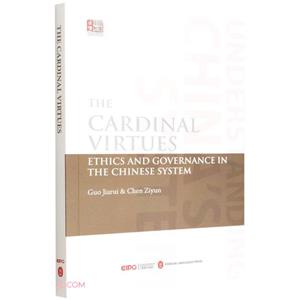-
>
論中國
-
>
中共中央在西柏坡
-
>
同盟的真相:美國如何秘密統治日本
-
>
中國歷代政治得失
-
>
中國共產黨的一百年
-
>
習近平談治國理政 第四卷
-
>
在慶祝中國共產主義青年團成立100周年大會上的講話
孝悌忠信,禮義廉恥——中國制度中的為政以德(英) 版權信息
- ISBN:9787119130361
- 條形碼:9787119130361 ; 978-7-119-13036-1
- 裝幀:一般膠版紙
- 冊數:暫無
- 重量:暫無
- 所屬分類:>>
孝悌忠信,禮義廉恥——中國制度中的為政以德(英) 本書特色
中華民族自古以來就有著崇德、尚德的傳統。“孝悌忠信,禮義廉恥”被奉為傳統美德的精髓,不僅指導著人們立身行道、進德修業,而且在治國理政中發揮著重要作用。千百年來,“八德”的深刻內涵被不斷挖掘,逐漸與國家治理、制度建設相融合,既深深影響了中國的傳統政治,也不斷塑造著當代中國的治理格局。本書通過古今“八德”經典故事對中國特色治國理政思想進行透徹講解,深刻揭示了“中國之治”背后的文化密碼。
孝悌忠信,禮義廉恥——中國制度中的為政以德(英) 內容簡介
“孝悌忠信,禮義廉恥”是中國的傳統八德。中華民族自古以來就有著崇德、尚德的傳統,把立德作為至高無上的人生追求。傳統八德作為中華傳統美德的精髓,每一個字都蘊含著深遠的智慧,不僅是人人奉行的立身之本,也是與他人和諧相處的秘訣,更是國家長治久安的重要保證。
本書選取了歷史上真實發生過的事件,將古老中國的傳統八德故事娓娓道來,并結合當今時代進行了深入解讀,幫助讀者了解傳統八德是以什么樣的面貌存在于過去,又有著怎樣深刻的力量,影響著世世代代的中華兒女,塑造出今天中國人民的模樣。
要讀懂今天的中國,首先要了解中國的歷史與文化,傳統八德就是其中很重要的一個部分。在漫長的歷史長河中,傳統八德已經不單單是個人的道德修養,而是逐漸與國家治理、制度建設以及社會風尚相融合。它們在中華大地上扎下了深深的根脈,凝聚出了強大的中國精神和中國力量,不僅使得中華人民有著獨特的價值體系,也促使中國走出了一條很好獨特的發展道路。
孝悌忠信,禮義廉恥——中國制度中的為政以德(英) 目錄
Foreword
Introduction
Chapter One From Filial to Universal Love
Li Mi, an Epitome of Loyalty and Filial Piety
Emperor Kangxi: An Exemplar in Practicing Filial Piety
Chapter Two When Everyone Honors Brotherhood, All Within the Four Seas Are Brothers
Duke of Zhou Prays for His Older Brother's Safety
King Mu Travels to the Western Regions and Cultivates Brotherhood in a Foreign Land
Chapter Three Upholding Righteousness and Impartiality for the State and the People
Fu Xie Benefits the People by Manifesting Loyalty
Zheng Xie Displays Loyalty and Loves the People
Chapter Four Integrity as the Utmost Virtue Is More Precious Than Gold
Meng Xin's Integrity Finally Pays Off Shang Yang Gains Credibility by Rewarding People for Moving a Log
Duke Wen of Jin Keeps His Promise and Retreats to Give Way
Chapter Five Propriety Is Critical for Personal Development, National Governance and Stability
The Hongxi Emperor Values Filial Piety and Attends to Ritual Utensils in Person
Duke Zhao Knows the Exterior of Propriety Instead of Its Essence
Chapter Six Righteousness as the Essential Quality of Great Men
Yanzi, a Righteous Man, Did Not Abandon His Wife After Achieving Success and Winning Recognition
Fan Zhongyan's Righteousness Benefits Later Generations
Unyielding Wen Tianxiang Dies for Righteousness
Chapter Seven Integrity as the Foundation of Good Governance
Integrity Being the Foremost Criterion in Mao Jie's Selection of Officials
Thrift and Integrity Underpinning the Prosperous Zhenguan Period of the Tang Dynasty
Chapter Eight Moral Virtues Are Critical for Individual Conduct and National Glory
With a Sense of Shame, Lian Po Carries Brambles on His Bare Back to Ask for Punishment
Goujian Tastes the Gallbladder to Remind Himself of National Humiliation
Classic Quotes
孝悌忠信,禮義廉恥——中國制度中的為政以德(英) 作者簡介
郭家瑞,倫敦大學亞非學院碩士,中國人民大學哲學博士,中國傳統文化促進會《群書治要》傳承委員會宣傳部部長。在《學習時報》《中國紀檢監察報》等發表論文多篇。
- >
苦雨齋序跋文-周作人自編集
- >
唐代進士錄
- >
二體千字文
- >
龍榆生:詞曲概論/大家小書
- >
企鵝口袋書系列·偉大的思想20:論自然選擇(英漢雙語)
- >
上帝之肋:男人的真實旅程
- >
詩經-先民的歌唱
- >
名家帶你讀魯迅:故事新編















